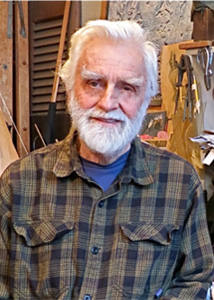 Ralph Lee is the founder of the Village Halloween Parade. Born in Middlebury, Vermont in 1935, he is a master mask-maker and currently artistic director of The Mettawee River Theatre Company, which has been dramatizing myths, folk tales and legends from diverse cultures for over 35 years. One of the original residents of Westbeth, Lee moved there with his family in 1970. He is currently on the faculty at NYU.
Ralph Lee is the founder of the Village Halloween Parade. Born in Middlebury, Vermont in 1935, he is a master mask-maker and currently artistic director of The Mettawee River Theatre Company, which has been dramatizing myths, folk tales and legends from diverse cultures for over 35 years. One of the original residents of Westbeth, Lee moved there with his family in 1970. He is currently on the faculty at NYU.
As a child growing up in Vermont, Ralph Lee discovered two passions he would pursue for the rest of his life: puppetry and the theater. “All my teenage years I made puppets and masks,” he says. “I would take them around to birthday parties and schools and do shows. Theater is something I really connected with very early on as well. I was in my first play when I was seven. It was in our one-room schoolhouse and I played a cat. After that, I was hooked!”
After graduating from Amherst College in 1957, Lee studied dance and theater in Europe for two years on a Fulbright Scholarship. Returning stateside, he moved to New York to act and began creating masks, puppets, and larger-than-life figures for theater and dance companies. “It happened one year that I taught for a semester at Bennington College,” he recalls. “They wanted me to do a production so I decided to do an ‘almost-pageant’ that took place outdoors and moved around the campus. The students made a lot of masks and giant puppets and I brought up stuff that I had made for other shows as well. I had never done anything like that before: the logistics, the costumes, and the large cast. It turned out to be a surprisingly successful event.”
Is this how the Village Halloween Parade came about? “Theatre for the New City had been bugging me to do something for Halloween and in 1974 I finally agreed,” Lee says. “Doing that event at Bennington had given me confidence so I felt able to embark on a larger project. I can’t remember who said the word ‘parade’ but it seemed like it was in all our minds. We envisioned it as a mile-long theatrical extravaganza winding through the Village.”
“I really liked those early days because people could enter and leave the parade at any point,” Lee continues. “By the fifth year the crowds were so large we had to erect barricades. My wish all along had been that people would come and see this parade and then go back to their communities and start their own. But that’s not what happened.” After running the parade for twelve years, Lee decided to give up the reins. “I felt it was time for me to move away and I’ve honestly never regretted that ,” he admits. “The final year that I did it was the first year it moved to Sixth Avenue. I’m definitely happy that it’s still going. I wouldn’t have wanted it to disappear but the feel of community was hard to sustain once the route changed.”
As a long-time resident of the West Village, Lee is grateful that he’s had the opportunity to be here, and that Westbeth has been such “a wonderful place to live.” But he does have some regrets. “It’s not fun the way it used to be and much of that is financial,” he says. “Due to commercial interests, a lot of people were squeezed out. As far as the people living here now, well you have to practically be a millionaire to do so. That really changes things.” He laughs. “That’s pretty simplistic, but it’s the way it feels.”
![lee_quote_mar_2014 "[The halloween parade] parade happened at a time in the village when things were more open and there was more sense of community."](http://www.westvillageoriginals.com/wp-content/uploads/2014/03/lee_quote_mar_2014.jpg) Even more indicative of change is the fact that a Halloween parade could probably never get off the ground now. “It’s interesting,” Lee says. “It seems to me that it would be very difficult to start an event like this nowadays. It happened at a time in the Village when things were more open and there was more sense of community. So many residents along the route would open their doors and let us set up lights in their apartments and put our ‘creatures’ on their rooftops and fire escapes. It really shifted the feel of the environment to be able to do that. But I can’t imagine that people today would open their doors that way.”
Even more indicative of change is the fact that a Halloween parade could probably never get off the ground now. “It’s interesting,” Lee says. “It seems to me that it would be very difficult to start an event like this nowadays. It happened at a time in the Village when things were more open and there was more sense of community. So many residents along the route would open their doors and let us set up lights in their apartments and put our ‘creatures’ on their rooftops and fire escapes. It really shifted the feel of the environment to be able to do that. But I can’t imagine that people today would open their doors that way.”
In other words, the Halloween parade was the product of a different West Village. “It was a wonderful coming together of just the right elements,” Lee agrees. “It’s hard to imagine that happening again in the City at this point.”
Photo: Maggie Berkvist
